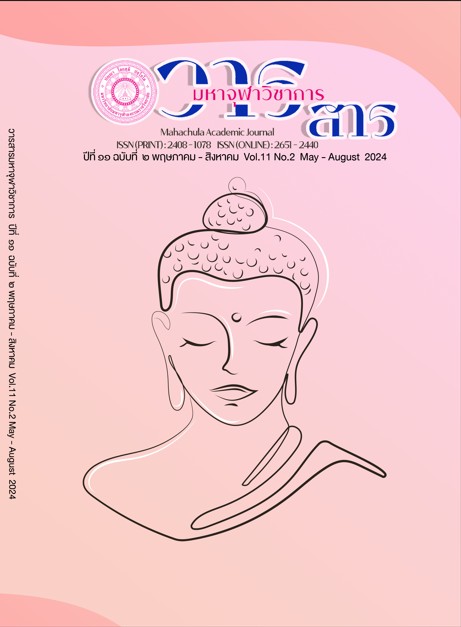Guidelines for the Development of Learning Ecosystems of Educational Institutions under the Office of Phra Nakhon Si Ayutthaya Secondary Educational Service Area
Main Article Content
Abstract
The purposes of this research were (1) to study the current and desirable conditions of the learning ecosystem of schools under the Phra Nakhon Si Ayutthaya Secondary Educational Service Area Office, (2) to present guidelines for developing the learning ecosystem of schools under the Office of Phra Nakhon Si Ayutthaya Secondary Educational Service Area. Phra Nakhon Si Ayutthaya Secondary Educational Service Area. The research methodology consisted of 2 steps: (1) to study the current and desirable conditions of the learning ecosystem of schools under the Phra Nakhon Si Ayutthaya Secondary Educational Service Area Office. The sample group was school administrators and heads of all 8 groups of learning subjects from 29 educational institutions with a total of ๒๖๑ people. All data were collected everywhere. The research tool was a questionnaire. The reliability was 0.98. The statistics used in data analysis were the mean standard deviation and the need index. (PNImodified) (2) Propose guidelines for developing the learning ecosystem of schools under the Office of Phra Nakhon Si Ayutthaya Secondary Educational Service Area. by interviewing 7 experts by specific selection method. The research tool was a semi-structured interview and analyzed the data by using content analysis method.
The results of the research revealed that (1) the current state of the learning ecosystem of educational institutions as a whole was at a high average level. The desirable condition was at the highest mean level. and demand index Overall, the value was ๐.๑๑. (2) Guidelines for developing the learning ecosystem of educational institutions under the Phra Nakhon Si Ayutthaya Secondary Educational Service Area Office consist of 5 aspects, 18 approaches. They are sorted according to the value of the necessary needs that need to be developed from the first order that needs to be developed as follows: (1) Contextuality There are 3 approaches, for example, educational institutions should provide elective courses or short-term courses that focus on teaching students to Gain professional skills by sourcing local raw materials to make products for sale. sales funnel financial planning for students and parents. (2) In terms of resources, there are 3 approaches, for example, educational institutions should study local communities for local wisdom or interesting knowledge and use them as a source of learning for students. (3) Organizational culture: There are 4 approaches, for example, educational institutions should encourage personnel in the organization to respect each other and give them the opportunity to express their opinions and accept different opinions. Respecting decisions and finding consensus. (4) There are 4 approaches to the learning process, for example, educational institutions must analyze school contexts to keep up with the rapid changes of the world trend. Collecting data for analysis, such as surveying success from student achievement, continuing education in order to plan goals and improve the curriculum to meet the needs of students. (5) Technology: There are 4 approaches, for example, educational institutions should use technology in teaching and learning by supporting technological devices that can appropriately facilitate learning management of teachers and students.
Article Details

This work is licensed under a Creative Commons Attribution-NonCommercial-NoDerivatives 4.0 International License.
References
นพภัสสร เลิศยศอนันต์. “การศึกษาความสัมพันธ์ระหว่างโรงเรียนกับชุมชน โรงเรียนการกุศลของวัดในพระพุทธศาสนา จังหวัดร้อยเอ็ด”. วารสารมหาวิทยาลัยมหามกุฏราชวิทยาลัยวิทยาเขตร้อยเอ็ด. ปีที่ ๗ ฉบับที่ ๑ (มกราคม – มิถุนายน ๒๕๖๑) : ๒๔-๓๔.
ภริมา วินิธาสถิตย์กุลและ ชนินันท์ แย้มขวัญยืน. “การเรียนรู้เชิงรุก : แนวทางการเรียนการสอนที่เป็นเลิศในศตวรรษที่๒๑”. วารสารนวัตกรรมการศึกษาและการวิจัย. ปีที่ ๖ ฉบับที่ ๓ (กันยายน – ธันวาคม ๒๕๖๕) : ๙๒๑-๙๓๓.
วาสนา จักรแก้ว. “การเพิ่มโอกาสและการเข้าถึงการศึกษาระดับอุดมศึกษาของเด็กด้อยโอกาสภาคเหนือตอนบน”. Veridian E-Journal มหาวิทยาลัยศิลปากร ฉบับภาษาไทย สาขามนุษยศาสตร์ สังคมศาสตร์ และศิลปะ. ปีที่ ๑๑ ฉบับที่ ๓ (กันยายน – ธันวาคม ๒๕๖๑) : ๑๗๖๗-๑๗๘๕.
วิจารณ์ พานิช. การสร้างการเรียนรู้สู่ศตวรรษที่ ๒๑. กรุงเทพมหานคร : มูลนิธิสยามกัมมาจล, ๒๕๕๖.
ศศินันท์ เศรษฐวัฒน์บดี. “การศึกษาระบบนิเวศการเรียนรู้ของสถานศึกษาในจังหวัดปทุมธานี”.
วารสาร EDU. คณะครุศาสตร์ มหาวิทยาลัยราชภัฏนครสวรรค์. ปีที่ ๖ ฉบับที่ ๑ (มกราคม – เมษายน ๒๕๖๖) : ๑๐๒-๑๑๓.
ศุภาพิชญ์ อินแตง. “วัฒนธรรมองค์กรที่ส่งผลต่อความสุขในการทำงานของกลุ่มเจนเนอร์เรชั่นวายในเขตกรุงเทพมหานครและปริมณฑล”. สารนิพนธ์การจัดการมหาบัณฑิต. คณะวิทยาลัยการจัดการ : มหาวิทยาลัยมหิดล, ๒๕๖๕.
สำนักงานเลขาธิการสภาการศึกษา. แผนการศึกษาแห่งชาติ พ.ศ.๒๕๖๐-๒๕๗๙. กรุงเทพมหานคร : บริษัท พริกหวานกราฟฟิค จำกัด, ๒๕๖๐.
________________. สภาพการจัดนิเวศการเรียนรู้ที่เหมาะสมกับบริบทประเทศ. สมุทรปราการ : บริษัท เอส.บี.เค. การพิมพ์ จำกัด, ๒๕๖๔.
สุกัญญา ล่ำสัน. “วัฒนธรรมองค์การที่ส่งผลต่อประสิทธิผลการบริหารงานโรงเรียน สังกัดสำนักงานเขตพื้นที่การศึกษามัธยมศึกษานครพนม”. วิทยานิพนธ์ครุศาสตร์มหาบัณฑิต. สาขาวิชาการบริหารการศึกษา: มหาวิทยาลัยราชภัฏสกลนคร, ๒๕๖๕.
สุรัตน์ แท่นประเสริฐกุล. “ระบบนิเวศนวัตกรรมในโรงเรียนที่มุ่งพัฒนานักเรียนนวัตกร”.
วิทยานิพนธ์ดุษฎีบัณฑิต. สาขาวิชาการบริหารการศึกษาคณะศึกษาศาสตร์ : มหาวิทยาลัยศรี-นครินทรวิโรฒ, ๒๕๖๔.
Fatih BAYDAR. “The Role of Educational Leaders in the Development of Students’ Technology Use and Digital Citizenship”. Malaysian Online Journal of Educational Technology. vol. 10 No.1 (2022) : 32-46.
Jeffrey Ludwig. “An Experiment in Active Learning: The Effects of Teams”. International Journal of Educational Methodology. vol. 7 No.2 (2021) : 353-360.
Jo Antonio Capece. “The Knowledge of Local Communities and School Knowledge: In Search of a Didactic Transposition in Natural Sciences”. Universal Journal of Educational Research. vol. 6 No.1 (2018) : 132-138.
Omer Faruk AK. “Analysis of Manager and Teacher Opinions on the Management of School Risks in the Framework of the Internal Control Risk Management Model”. Educational Policy Analysis and Strategic Research. vol. 16 No.2 (2021) : 208-245.
Xinzhuo Zhu and Jingya Luo. “Family capital and the quality of senior secondary education opportunities: An analysis based on the post-junior secondary education tracking in county B of Jiangsu province”. Best Evidence in Chinese Education. vol. 13 No.1 (2023) : 1679-1688.


